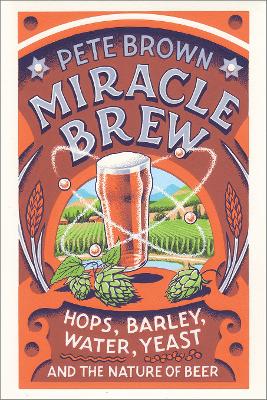Reviewed by annieb123 on
One of two things happen, after 20 minutes or so, you're willing to fake a heart attack to get away from them or you're suddenly catching the fever and find yourself signing up for a beginner beekeeping/water gardening/butterfly collecting/14th century Danish textile history class and thinking, 'Ok, this sounds really cool'!
This is the latter. As a member of the Society for Creative Anachronism, I have brewed beer (and mead and wine etc). I'm a beekeeper, I'm a fanatical gardener, but apart from my relatively hit-or-miss forays into beer brewing, I hadn't really thought about the magical process itself or why the things which happen, happen. Even as a hobby historian, I hadn't really thought about the complex and fascinating history of beer and brewing. I (like most) had heard the oft-told apocryphal Egyptian 'accidental brewing' story (i.e., grain got wet, dried out, got wet again and someone hungry said 'I'm gonna eat/drink it anyhow, can't afford to let it go to waste' and got drunk, then sat and thought, 'That was great, I'm gonna do that on purpose from now on'!).
Pete Brown logically dissects and debunks that story and many others about how and when humans settled down into more or less stable groups (malting for brewing could be one reason we did settle into more agrarian settlements). His writing style is wonderfully accessible and humorous (but not in the slightest precious or overly cute). He writes WELL about a subject on which he displays a stunning depth of knowledge. Additionally he backs it up with extensive research and references and does it in a way which isn't dry or boring at all. His descriptive powers concerning such relatively mundane acts as swallowing the first mouthful of beer on a hot day are amazing.
I really enjoyed this book very much.
The book is set up in sections, Barley, Water, Hops, and Yeast comprise the majority of the book. The last section is more narrative and discusses the cultural implications of beer, specifically the Reinheitsgebot, a 500(ish) year old law passed (some say it was the first and oldest food standards legislation in human history) in Bavaria to insure that beer was only made from its 3 principal ingredients (hops, barley, water - and later when we figured out what yeast is, included that as well).
This section of the book is really very funny and discusses amongst other things, the way beer fanatics discuss beer between themselves, beer tourism and beer-bonding.
The best takeaway line in the book:
Keep calm and have another beer.
I think I will, thanks! :)
Four stars
Disclosure: I received an ARC at no cost from the author/publisher.
Reading updates
- Started reading
- 20 August, 2017: Finished reading
- 20 August, 2017: Reviewed
